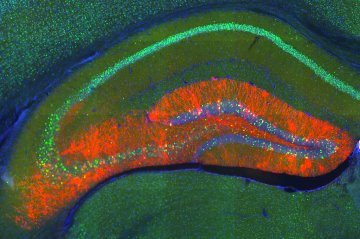Aug. 28, 2015 Research Highlight Biology
The power of positive memories
Stress-induced depression can be overcome in mice by inducing the firing of neurons that had been active during a positive experience
 Figure 1: By using light to reactivate neurons that were active during a positive experience, researchers have found a way to reverse depression-related behaviors in mice. The same effect was not observed for mice subjected to the stressful experience of being immobilized. Adapted by permission from Macmillan Publishers Ltd: Nature Ref. 2, copyright 2015
Figure 1: By using light to reactivate neurons that were active during a positive experience, researchers have found a way to reverse depression-related behaviors in mice. The same effect was not observed for mice subjected to the stressful experience of being immobilized. Adapted by permission from Macmillan Publishers Ltd: Nature Ref. 2, copyright 2015
Chronic stress can cause symptoms of anxiety and depression in many organisms, including mice and humans. A team of RIKEN researchers has discovered that stimulating brain cells that had previously fired during a positive experience blocks the stress-induced onset of depressive behaviors in mice1. This finding may assist in identifying the circuits that need to be targeted to treat depression in people.
Susumu Tonegawa and his colleagues at the RIKEN–MIT Center for Neural Circuit Genetics at the Massachusetts Institute of Technology (MIT) exposed one population of male mice to the rewarding experience of spending time with a female, and another population to the stressful experience of being immobilized. All the mice had been genetically engineered so that only neurons activated during these two experiences would express a special protein channel, which the researchers could later artificially stimulate by shining a blue light into the brain.
Previous studies had shown that mice exposed to chronic stress exhibit depression-like behaviors, such as loss of interest in drinking a sugary solution and a lack of effort to right themselves when suspended by their tails. Stressed mice also demonstrate greater anxiety than unstressed mice. For example, stressed mice tend to stick to the edges of an open field instead of venturing out to explore the more exposed center.
In their latest experiment, Tonegawa and his colleagues discovered that reactivating neurons that had previously been active during a positive experience prevented depression-like behaviors in mice exposed to chronic stress. But they found that the same effect did not occur when they reactivated neurons that had been activated during a negative experience (Fig. 1).
However, stimulating these neurons did not block the induction of anxiety. These findings suggest that other parts of the brain not targeted by the reactivation approaches in this study may modulate stress-induced anxiety.
Making new neurons
 Figure 2: Memory engram cells (red) that were active during a positive experience, seen in the hippocampus. © 2015 Susumu Tonegawa, RIKEN–MIT Center for Neural Circuit Genetics
Figure 2: Memory engram cells (red) that were active during a positive experience, seen in the hippocampus. © 2015 Susumu Tonegawa, RIKEN–MIT Center for Neural Circuit Genetics
A structure in the brain known as the hippocampus exhibits many changes in response to stress and depression. For example, both stress and depression have been shown to reduce new neuron formation, or neurogenesis, in the hippocampus. Tonegawa and his colleagues found that mice exposed to chronic stress had fewer newly generated neurons than mice that had not been stressed. But they also discovered that light-induced reactivation of neurons that had been active during a positive experience (Fig. 2) restored neurogenesis in the hippocampus of stressed mice.
Antidepressants, which are used by millions of people worldwide, can induce hippocampal neurogenesis if taken for extended periods of time. In contrast, Tonegawa’s team observed increased neurogenesis after just five days of reactivating neurons that had been active during a positive experience. This enhanced neurogenesis may be tied to the beneficial effects they observed in their mice. The researchers suggest that the brain plasticity—a concept used to describe the brain’s ability to change in response to new stimuli and experiences—that takes a long time for antidepressants to achieve could be rapidly mobilized by identifying and stimulating neurons linked to a positive experience.
Pinpointing critical brain cell circuits
Many parts of the brain may work together in a circuit to encode positive experiences and their influence on behavior. Tonegawa and his co-workers used light to stimulate the hippocampal neurons that had previously been labeled during exposure to a positive experience. They then used a marker to label neurons in other brain areas that were activated by the hippocampal cells, including the basolateral amygdala and the nucleus accumbens, two brain areas known to play a role in modulating behavioral responses to reward.
When the researchers used gene-therapy approaches to prevent neurons in the basolateral amygdala from firing, the stimulation of hippocampal neurons that encode positive experiences ceased to induce antidepressant responses in stressed mice. This suggests that the circuit from the hippocampus to the basolateral amygdala plays a key role in encoding how positive experiences can block the effects of chronic stress.
Many axons that utilize the neurotransmitters glutamate and dopamine extend from the basolateral amygdala to the nucleus accumbens, and the connections between these brain structures are known to be involved in responses to stressful events. The researchers showed that administering drugs in the nucleus accumbens that block dopamine or glutamate suppresses the antidepressant-like effects of light stimulation of hippocampal cells linked to a positive experience. Therefore, they conjecture that this circuit may be a nexus in which information linking a stimulus with a reward combines with the current motivational landscape in which an animal finds itself to drive behavioral outcomes.
Fighting depression
The findings by Tonegawa and his colleagues may shed light on a neurosurgical technique for treating depression known as deep brain stimulation. This technique involves implanting a stimulator within the brain cortex of depressed individuals who have failed to respond to more conventional pharmacological treatments. The extent to which the circuits and pathways identified in this study play a role in the beneficial effects of deep brain stimulation remains to be explored. If these same circuits and neurotransmitter systems are linked to the encoding or the recall of positive experiences in humans during stressful life events, the findings could lead to new therapeutic approaches for fighting depression in people.
The research points the way forward to a radically new approach for treating depression. “Most depression therapies focus on systemic drugs,” notes Tonegawa. “Our findings suggest that treatment may be achievable by stimulating specific neural circuits.”
References
- 1. Ramirez, S., Liu, X., MacDonald, C. J., Moffa, A., Zhou, J., Redondo, R. L. & Tonegawa, S. Activating positive memory engrams suppresses depression-like behaviour. Nature 522, 335–339 (2015). doi: 10.1038/nature14514
- 2. Dranovsky, A. & Leonardo, E. D. Neuroscience: The power of positivity. Nature 522, 294–295 (2015). doi: 10.1038/522294a
About the Researcher

Susumu Tonegawa received his doctorate from the University of California, San Diego, in the United States. He then undertook postdoctoral work at the neighboring Salk Institute for Biological Studies before moving to the Basel Institute for Immunology in Switzerland, where he performed his landmark immunology experiments. In 1987, Tonegawa was awarded the Nobel Prize in Physiology or Medicine. Using advanced genetic manipulation techniques, Tonegawa is now unraveling the molecular, cellular and neural circuit mechanisms that underlie learning and memory. He is currently director of both the RIKEN–MIT Center for Neural Circuit Genetics at the Massachusetts Institute of Technology and the RIKEN Brain Science Institute in Japan.
